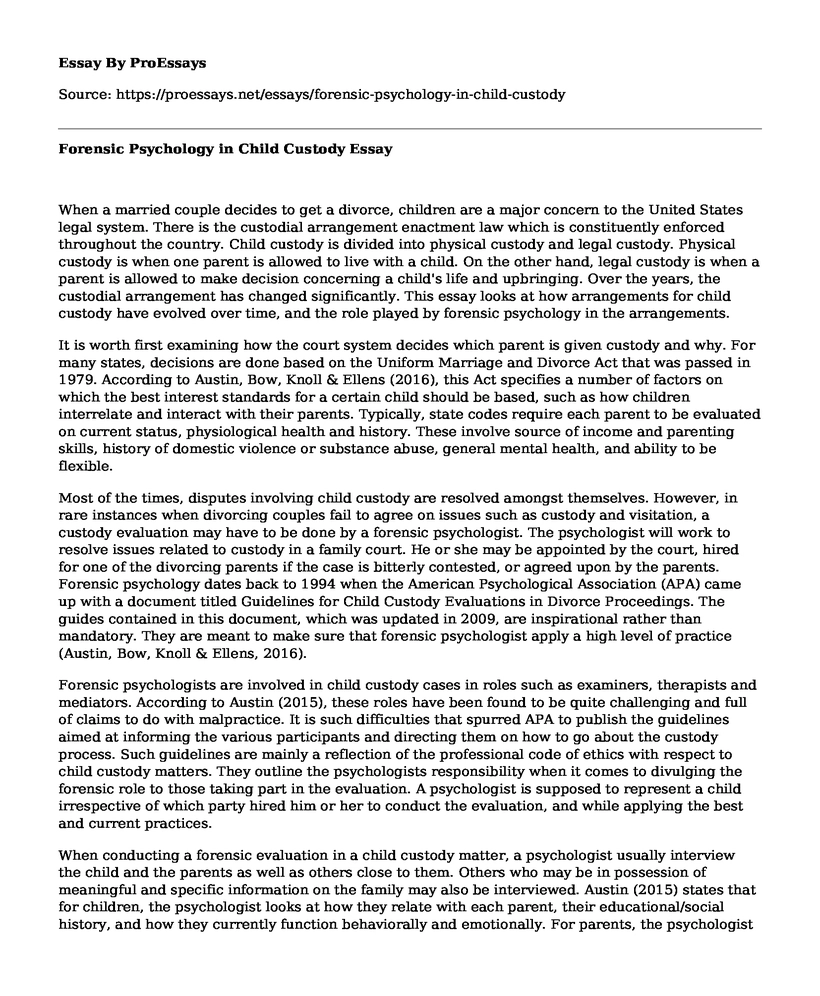When a married couple decides to get a divorce, children are a major concern to the United States legal system. There is the custodial arrangement enactment law which is constituently enforced throughout the country. Child custody is divided into physical custody and legal custody. Physical custody is when one parent is allowed to live with a child. On the other hand, legal custody is when a parent is allowed to make decision concerning a child's life and upbringing. Over the years, the custodial arrangement has changed significantly. This essay looks at how arrangements for child custody have evolved over time, and the role played by forensic psychology in the arrangements.
It is worth first examining how the court system decides which parent is given custody and why. For many states, decisions are done based on the Uniform Marriage and Divorce Act that was passed in 1979. According to Austin, Bow, Knoll & Ellens (2016), this Act specifies a number of factors on which the best interest standards for a certain child should be based, such as how children interrelate and interact with their parents. Typically, state codes require each parent to be evaluated on current status, physiological health and history. These involve source of income and parenting skills, history of domestic violence or substance abuse, general mental health, and ability to be flexible.
Most of the times, disputes involving child custody are resolved amongst themselves. However, in rare instances when divorcing couples fail to agree on issues such as custody and visitation, a custody evaluation may have to be done by a forensic psychologist. The psychologist will work to resolve issues related to custody in a family court. He or she may be appointed by the court, hired for one of the divorcing parents if the case is bitterly contested, or agreed upon by the parents. Forensic psychology dates back to 1994 when the American Psychological Association (APA) came up with a document titled Guidelines for Child Custody Evaluations in Divorce Proceedings. The guides contained in this document, which was updated in 2009, are inspirational rather than mandatory. They are meant to make sure that forensic psychologist apply a high level of practice (Austin, Bow, Knoll & Ellens, 2016).
Forensic psychologists are involved in child custody cases in roles such as examiners, therapists and mediators. According to Austin (2015), these roles have been found to be quite challenging and full of claims to do with malpractice. It is such difficulties that spurred APA to publish the guidelines aimed at informing the various participants and directing them on how to go about the custody process. Such guidelines are mainly a reflection of the professional code of ethics with respect to child custody matters. They outline the psychologists responsibility when it comes to divulging the forensic role to those taking part in the evaluation. A psychologist is supposed to represent a child irrespective of which party hired him or her to conduct the evaluation, and while applying the best and current practices.
When conducting a forensic evaluation in a child custody matter, a psychologist usually interview the child and the parents as well as others close to them. Others who may be in possession of meaningful and specific information on the family may also be interviewed. Austin (2015) states that for children, the psychologist looks at how they relate with each parent, their educational/social history, and how they currently function behaviorally and emotionally. For parents, the psychologist examines parenting strengths and weaknesses, behavioral patterns, and current emotional state. Often, direct observation is valued as it offers more information on interactions between children and parents.
References
Austin, W. G. (2015). Child custody evaluation and relocation: Part II: Options for a systematic approach to forensic evaluation. American Journal of Family Law, 29.
Austin, W. G., Bow, J. N., Knoll, A., & Ellens, R. (2016). Relocation issues in child custody evaluations: A survey of professionals. Family Court Review, 54(3), 477-486.
Cite this page
Forensic Psychology in Child Custody. (2021, Mar 25). Retrieved from https://proessays.net/essays/forensic-psychology-in-child-custody
If you are the original author of this essay and no longer wish to have it published on the ProEssays website, please click below to request its removal:
- Research Paper Example on Validation of Forensic Tools
- The Impact of the Mental Capacity Act of 2005
- Essay Sample on Israel's Criminal Justice System
- Essay Sample on 27 Amendments: How Miranda V. Arizona Changed the U.S. Constitution
- Essay Example on Digital Hacking: Growing Threats in the 21st Century
- Essay on Re-Designing Wards at McLean Hospital to Reduce Aggression in Mental Illness Patients
- Essay Example on Vincent van Gogh: Unlucky in Love & Unconventional Choices







